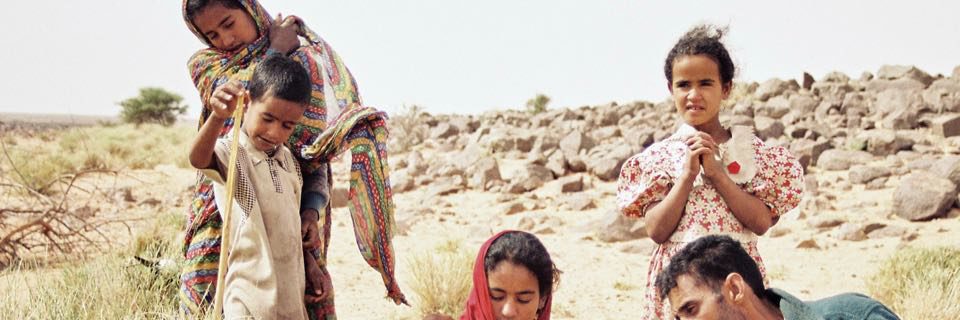The middle of nowhere
Spending time with the nomad family provided a fascinating insight into their way of life. The contrast with Atar was stark. Now far from the hustle and bustle, the only noises here were the wind blowing across the stony plain and the occasional bleat from a goat.
Outside the tent the plain stretched to the horizon, uninterrupted in all directions. It was impossible not to feel insignificant. We were merely temporary dots on this timeless landscape. I could barely believe that in a few weeks we’d be out there day and night, inching our way across the emptiness.
Bill dug into his bag and brought out our GPS unit. It was the size of a 1980s car phone but was considered compact at the time. The screen was also an old school LCD that was hard to read in the sun.
We weren’t sure if we had brought enough batteries to last the trip so we had to be swift. Bill read out the coordinates, Len plotted them on the map. We crowded around, eager to see where we were.
As expected, there was nothing of note anywhere near us. It was a part of the map that was almost entirely featureless. That was exciting in itself. None of us had ever been to such a remote location.
Language barrier
Back in Atar most people, including Hakim, spoke French and we were able to chat with them. It was at a fairly basic level but we could at least get our point across and understand each other most of the time.
Out here there was no French at all. The nomads only spoke Hassaniya Arabic and our communication was limited to “Hello, how are you?”. We couldn’t even understand the response.
It meant we were dependent on Hakim to translate for us and tell us what to do. Something that perhaps cost us later.
Grinding flour
The nomads appeared to be largely self sufficient, farming goats and grinding their own flour to make bread.
Len, always keen to get involved, tried his hand at grinding flour under the watchful eye of the matriarch of the family. Bill and I couldn’t help laughing as it wasn’t long before she asked for it back.
Tea ritual
From what we had seen of Mauritania so far, in each family there was usually a designated tea maker whose task was to prepare mint tea throughout the day.
It was extremely sweet and served in tiny glasses, which meant three rounds was considered a minimum at any one sitting.
The nomad family was no exception and a young girl in red robes dutifully prepared the tea throughout the day.
Neither Bill nor Len liked the tea and at Hakim’s house they would stomach the first round before passing the next two on to me. I quite liked it. That arrangement wasn’t going to be possible here.
We didn’t want to risk offending someone, we couldn’t even talk to them. To my amusement they had to drink all the tea they were served and then appear to like it.
Family hierarchy
Dinner was served and Hakim gestured that we should sit at one end of the tent with all the other men. The women sat at the other end.
We sat in a circle around a huge bowl of rice stew on the floor just like we used to at Hakim’s. The men chatted amongst themselves; we understood nothing. It was a shame we couldn’t speak their language and ask them about life in the middle of nowhere. For all we knew we may have been the topic of conversation.
The women also talked amongst themselves. There was no conversation between the groups at opposite ends of the tent. If there were any married couples in the tent there was no way of telling.
Surprise in the night
After dinner we prepared to sleep. As we lay on the floor with everyone else, the tent started flapping ominously as the wind picked up. The nomads began chattering with each other and soon got up and went outside.
Why? A sandstorm was approaching!
We jumped up and followed, eager to help out and not just be the useless tourists. We were also curious to see how nomads dealt with a sandstorm.
One of the more common trees we had seen in Mauritania had vicious spines about two inches long (to protect itself from being eaten by camels). The nomads were snapping these off and using them to pin the panels of the tent cloth together. We joined in, barely able to hear each other over the ferocious wind. Then we huddled down for a long night.
The morning after
The following morning I woke with sand everywhere. It was in my ears, eyes, nose and mouth. Trying to rub it out of my eyes with gritty hands only made it worse. I dusted off my sleeping bag and sat up. Everything inside the tent was coated with a thin film of fine sand; the strength of the wind had forced it through the fabric walls of the tent.
Outside, there was sand piled up against the sides of the tent like a snowdrift but it seemed to make no difference to the nomads, who were busy preparing the first meal of the day.
A steaming pot of broth was cooking over a makeshift stove the nomads had fashioned out of an old metal drum. It was half buried in the sand to stop it rolling away and keep in the heat.
A fire was burning in the barrel. The nomads kept a large log burning through the night so the fire could be restarted from the embers each morning.
For the nomads it was the start of another day just like any other. For us, it was time to buy some camels.


